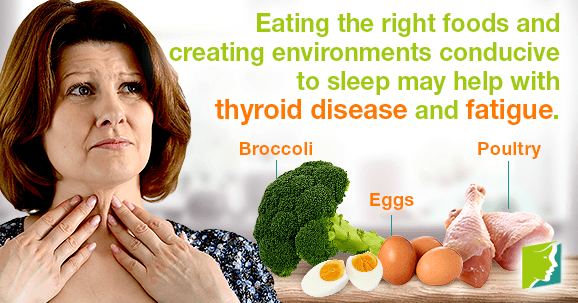Thyroid disease and fatigue can often go hand in hand, although this is not always the case. Both of these conditions can be disruptive and have a devastating impact on daily life because of their bothersome symptoms. Read on to discover the main things to know about thyroid problems and fatigue.
Thyroid Problems
The two conditions relating to the thyroid gland are hyperthyroidism (when too much thyroid hormone is produced) or hypothyroidism (when not enough hormone is produced). The latter is far more common.
Protein is important
The two main functions of this gland are to control the metabolism and regulate growth in early life. In order to create the correct hormones, the gland needs iodine and also amino acids from protein, a lack of which can result in problems with the thyroid, although thyroid problems can also be genetic. Therefore, in order to avoid developing hyper- or hypothyroidism, good foods to eat are eggs, poultry, and broccoli, for example. Most salt comes iodized, meaning it already has iodine added to it for health benefits.
The thyroid is essential for energy
The thyroid gland is situated near the throat and is part of the endocrine system. It produces the thyroid hormones, which mainly control metabolic and growth functions. If not enough or too much of these essential hormones is being produced, then one of the main processes energy regulation, the metabolism, is not functioning properly. Thus, fatigue ensues.
Fatigue
Fatigue is a feeling of relentless tiredness, and it is a common symptom of thyroid problems, although there are many other causes.
Sleeping more is not always the answer
A person experiencing fatigue will often have heavy eyelids, a lack of focus on tasks, difficulty concentrating, and also be very irritable. Fatigue can often be combated through more sleep, but sometimes even after sleeping, a person will not feel refreshed. Not enough is known about the condition itself to understand why this is, but often it can be indicative of an underlying medical condition, such as the above mentioned thyroid problems or depression.
It is important to eat a diet rich in iron
Lack of this dietary mineral will result in an insufficient amount of red blood cells being produced. This is a major cause of fatigue because red blood cells are responsible for transporting oxygen to all the major organs. Therefore, a diet low in iron can lead to organs that are not functioning to their optimum capacity. Examples of foods rich in this substance are spinach, beef, and lentils.
Thyroid disease and fatigue are a nuisance but can be dealt with. Eating the right foods and creating environments conducive to sleep are the obvious first steps. However, if the problems persist it is important to talk to your doctor, who will be able to advise you on the best course of treatment.
Sources
- This article discusses things you should know about thyroid disease and fatigue.




